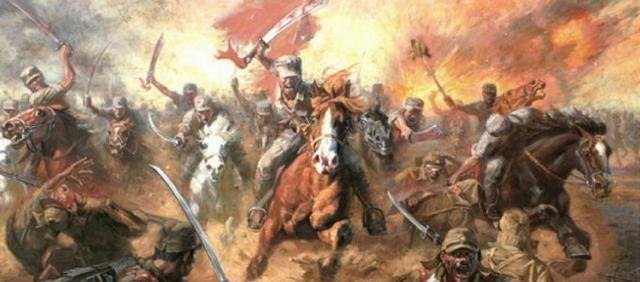"The big knife slashed at the devils' heads!" Patriotic compatriots of the whole country! The day of the War of Resistance has come, and the day of the Great Knife March stage performance of the War of Resistance has come...". The name of this song is called "Big Knife March", most of the post-90s or post-00s today may not know much, but the older generation is certainly not unfamiliar, it is a popular anti-Japanese salvation song in the 1830s, often appearing in some anti-war film and television dramas.
The March of the Great Knife is based on the Battle of Kihoguchi in 1933, after which the Asahi Shimbun wrote: "Since the Meiji Emperor created the army, the Japanese army has lost its reputation outside the Kihoguchi And suffered an insult that has not been seen in sixty years. "And it is said that since then, many Japanese troops have to wear an iron ring around their necks when they sleep at night, what did Zhang Zizhong, the leader of that battle, do?

During the September 18 Incident, the Nationalist government adopted a policy of non-resistance to Japan's aggression, which led to the loss of a large amount of land. The Japanese army did not fight a little challenging, so they looked down on Chinese, arrogant, and promised to take China in 3 months. Xifengkou was located at the junction of Hebei Province and Rehe Province at that time, was a Great Wall Pass, the geographical location was special, there were Tiemen Pass in the east, Dongjiakou, Panjiakou and Luo Wenyu in the west, connecting Rehe and Beiping, which was an important barrier for the Northern Guard of the Beijing Division, and once it lost the north, it was dangerous.
On January 10, 1933, zhang Zizhong's 38th Division of the 29th Army received orders to support the Xifengkou garrison and cooperate with the operation. Unexpectedly, as soon as their advance regiment arrived, the Japanese army had 500 cavalry blocked at the foot of the Great Wall, and had to be forced to fight. Fortunately, the 29th Army was reorganized from the original Northwest Army, the generals were all northwestern, the people there were fierce, almost everyone had a foundation in martial arts, dared to fight and rush, fearlessly lived and died, and the whole "Desperate Sanlang Group" finally held the position.
Previously, in order to improve the combat effectiveness of the troops, Song Zheyuan, commander of the 29th Army, also specially equipped a large knife for each of the soldiers, and also specially invited Mr. Li Yaochen, a martial artist, as a coach, to personally teach and specially make up a set of knives that can be both split and stabbed for use on the battlefield.
The knife is also carefully selected, and the Japanese army's whole body is made of stainless steel, quenching and forging technology are very sophisticated and tough narrow knives; the knife held by the 29th Army general is caused by the whole piece of steel, the entire knife body is relatively wide, only the top is pointed, and the handle also carries a large iron ring, whether it is the manufacturing process or the shape, and the Japanese army is incomparable. However, its wide body is the nemesis of the sharp and narrow knife of the Japanese army, which has been tested by countless actual battles.
On March 9, 1933, the 38th Division led by Zhang Zizhong fought with the Japanese army on the extremely high ground on both sides of the Xifeng Pass. After two days and two nights of resistance, although Zhang Zizhong's troops held their positions, the Japanese army had many reinforcements, excellent weapons, and the disparity in strength between the two sides, and continuing to fight hard was not an opponent at all. In addition, the Mengziling Heights are still in the hands of the Japanese army, which is very unfavorable to their own side. Therefore, he summoned his subordinates Feng Zhi'an, Qin Dechun, Zhao Dengyu and others to discuss the policy, and finally decided to use their strengths and avoid weaknesses, not to confront the Japanese army head-on, and to carry out night attacks.
On March 11, 1933, Zhang Zizhong mobilized about 4 regiments of troops, and took advantage of the early morning when the Japanese army was most relaxed, and attacked the enemy camp at Xifengkou at night. He quietly harvested the lives of thousands of enemy troops with large knives, captured 11 tanks, 6 armored vehicles, 18 cannons, 36 machine guns, 1 aircraft, maps, video cameras and other objects, as well as the Japanese imperial flag, so that it was forced to retreat 15 kilometers, which can be described as a complete victory and shocked the Japanese rulers.
And Zhang Zizhong's action also left a shadow on the Japanese army invading China, afraid that if he accidentally fell in his sleep, his head would be cut off and he would die. So many people made their own iron collars and put them around their necks when they slept to save their lives. This battle struck a blow at the arrogance of the Japanese aggressors, and also greatly inspired the fighting spirit of other soldiers and civilians in the War of Resistance, and let everyone know the heroic and fearless army of the 29th Army and their courageous and scheming leader Zhang Zizhong.